How To Stop Windows Media Player Network Sharing Service
The Windows Media Histrion (WMP) has a media sharing functionality that allows you to stream your PC'south media library to other devices over a network. Wmpnetwk.exe is the process that handles the media sharing service in the background.
When you enable media sharing on WMP for the outset time, wmpnetwk.exe starts indexing your media library immediately. You may notice a spike in CPU usage during this functioning, or when streaming media files to other devices.
That should plunge as soon as your files are indexed successfully. If wmpnetwk.exe continues to squealer organization resource when you aren't sharing media files, jump to the troubleshooting steps below. Simply first, verify the safe and legitimacy of the wmpnetwk.exe file.
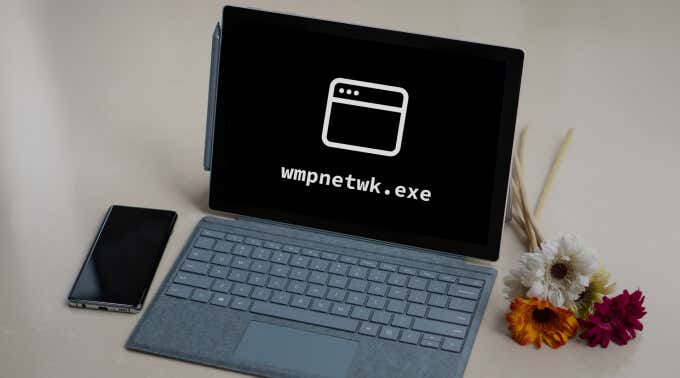
Wmpnetwk.exe Could Be a Virus or Malware
A virus or trojan can camouflage itself as the legitimate wmpnetwk.exe plan file to infect your computer. So before anything else, verify that the wmpnetwk.exe slowing down your computer is the genuine program file.
i. Launch the Job Director, go to the Details tab, right-click wmpnetwk.exe, and select Properties.
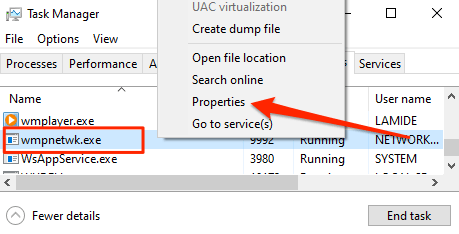
2. In the General tab, ensure the file location reads C:\Program Files\Window Media Role player.
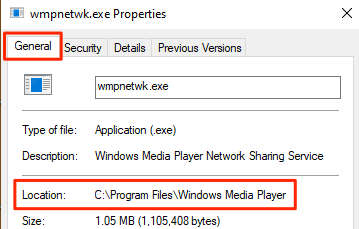
If the file is outside this folder, information technology'due south nearly likely a malicious program camouflaged as wmpnetwk.exe. Run the file through your anti-malware scanner or delete it from your device immediately. However, if wmpnetwk.exe is in the appropriate location, the troubleshooting steps below should fix the trouble.
1. Stop the Windows Media Role player Network Sharing Service
To resolve the issue with wmpnetwk.exe using high retention or CPU resource, we recommend terminating the Windows Media Player Network Sharing Service. Printing the Windows key + R to launch the Windows Run box. Type services in the dialog box and select OK.
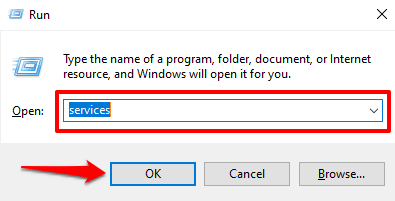
That'll launch the Windows Services Manager. Scroll through the services on the list, right-click "Windows Media Thespian Network Sharing Service" and select Stop.
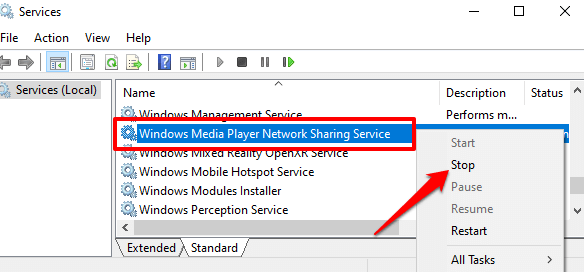
Head to the Task Manager and verify that Windows stopped the service. Reboot your calculator and check the Job Manager in about 5 – 20 minutes. If the wmpnetwk.exe exploit has relaunched or otherwise continues running in the background, jump to the next troubleshooting step to change its startup behavior.
2. Disable Automatic Startup for the WMP Network Sharing Service
By default, Windows will start the wmpnetwk.exe process automatically about 2 minutes subsequently your PC and other important services showtime. This is known every bit a "Delayed Start."
The ripple effect of this startup type is that wmpnetwk.exe may linger in the background—endlessly consuming loftier memory and causing high CPU usage—even when y'all aren't using the Windows Media Actor.
Configuring the WMP Network Sharing Service to only run when you manually start it should resolve the problem. Open the Windows Services Manager and double-click "Windows Media Player Network Sharing Service."
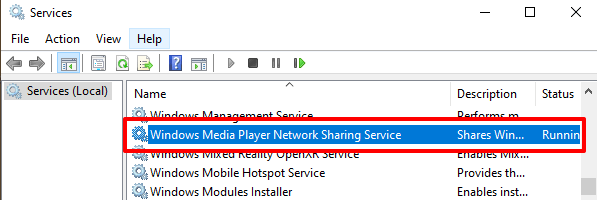
Select the Startup type drop-downwardly button and select Manual from the options.
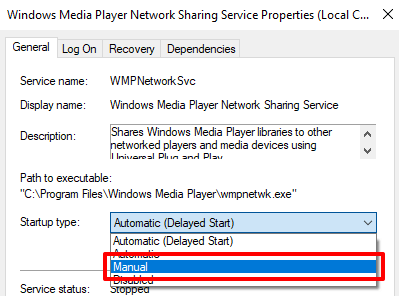
Afterward, select Apply and so select OK to salve the change.
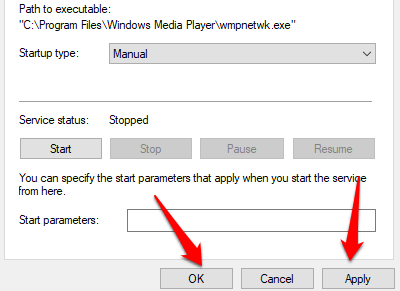
3. Disable the App's Network Sharing Service
Configuring the WMP network sharing service to startup manually is a temporary fix, specially if you lot don't use Windows Media Player. Disabling the service is a much better alternative.
You won't be able to stream or share content to networked devices using Windows Media Player. Only that shouldn't be a problem since you don't use the app, right? Also, you can always re-enable the service any fourth dimension in the future.
Open up the Windows Services Manager, double-click Windows Media Role player Network Sharing Service, select the Startup type drop-downwardly button, and select Disabled.
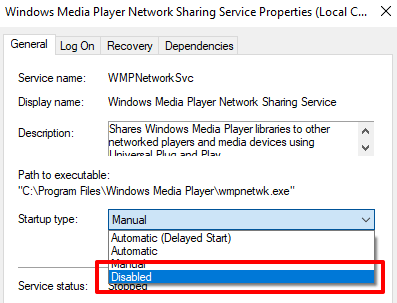
four. Turn Off Media Streaming
If wmpnetwk.exe encounters a problem while indexing or streaming your media files, information technology could become stuck in the groundwork. Disabling media streaming should solve the trouble, especially if yous don't programme to stream your media files with other devices.
1. Launch the Windows Media Player, select the Stream drop-down option at the top-right corner, and select More streaming options.
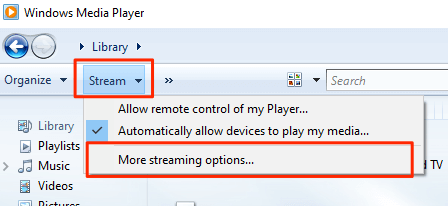
ii. Alternatively, open up the Windows Command Panel, select Network and Sharing Eye, and select Media streaming options on the sidebar.
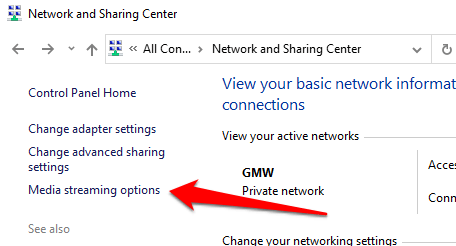
3. Finally, uncheck the Allowed box next to "Media programs on this PC and remote connections" and select OK to save the modify.
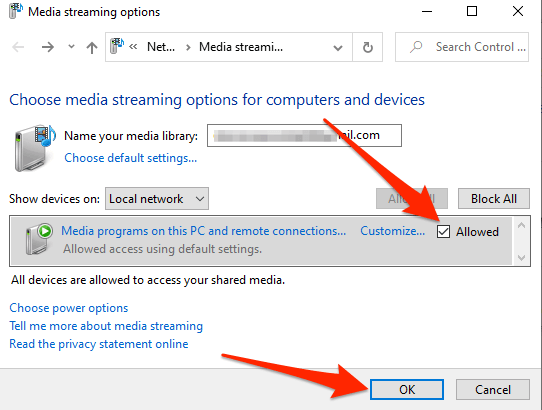
That'll disable media streaming on your local network and finish the wmpnetwk.exe procedure from running in the background.
five. Uninstall Windows Media Player
You'll never take to bargain with the wmpnetwk.exe menace if you remove Windows Media Histrion from your computer. It'southward a permanent solution to the trouble—similar unrooting a weed from your garden.
Consider uninstalling Windows Media Player in the unlikely event that none of the troubleshooting steps in a higher place fixed the problem. Or, if you use third-party media players or servers similar VLC, Quicktime, Plex, or Kodi.
1. Launch the Control Panel, select Programs and Features, and select Turn Windows features on or off.
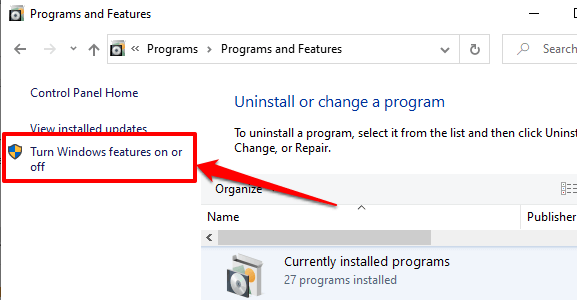
ii. Expand the Media Feature folder, uncheck Windows Media Actor, and select OK.
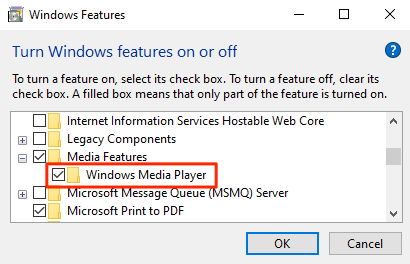
3. Select Yeah on the confirmation prompt to proceed. You may demand to provide your account credentials during the process.
[15-uninstall-windows-media-player-01]
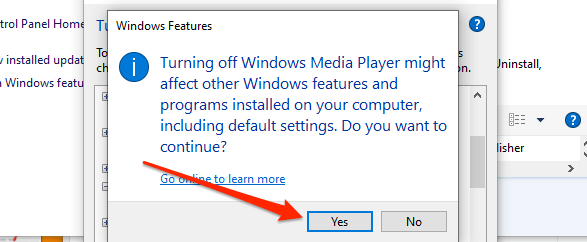
iv. Restart your PC for the changes to have upshot. If y'all ever need to reinstall the app, refer to this guide on downloading Windows Media Player 12 for Windows.
Did terminating wmpnetwk.exe resolve the high memory or CPU usage issues? Or did you have to stop or disable the process? Let us know which 1 did the flim-flam.
Practice non share my Personal Information.
Source: https://helpdeskgeek.com/windows-10/fix-wmpnetwk-exe-high-memory-and-cpu-usage-in-windows/
Posted by: tietjenponjuseme64.blogspot.com

0 Response to "How To Stop Windows Media Player Network Sharing Service"
Post a Comment